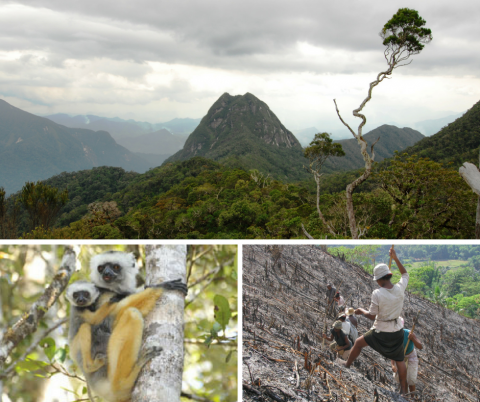How Do People Affect Zoonotic Disease Dynamics in Madagascar? (2018-2019)
This project investigated the links between biodiversity, infectious disease and human health in a rural community in Madagascar. Research has documented conflicting associations between land use change and infectious disease risk, with some studies finding that deforestation increases disease risk for humans, while other studies find the opposite pattern. It is critically important to make sense of these conflicting patterns. One approach is to design studies that elucidate the mechanisms that drive associations between land use change and infectious disease risk for humans. One such mechanism is that deforestation alters wildlife communities by reducing habitat for native species and introducing invasive species, thus changing the disease dynamics of biological systems. The specific effects of human activities on disease, however, depend on the intensity of land use, the original biodiversity and other factors.
This Bass Connections project investigated how human land-use decisions affect the small mammal community and disease transmission around the Marojejy national park. Human subsistence activities and population growth are encroaching on the protected rainforest in the area. The project team synthesized evidence on how human activities influence infectious disease risk globally, collected new data on infectious diseases in humans, domesticated animals and wild mammals and identified policy actions that reduce disease risk and conserve biodiversity. The team produced two manuscripts that they plan to submit for publication. Both manuscripts focus on disease ecology.
In Madagascar, the team tested specific hypotheses for how land-use decisions alter ecological communities and influence disease transmission. Team members assessed the factors that lead some humans to experience greater risk of acquiring infectious diseases from wild animals. The team generated preliminary reports for the Madagascar Ministry of Environment and Ministry of Health. These reports help raise awareness about environmental health issues, and provide some initial recommendations based on the team’s research.
Timing
Summer 2018 – Spring 2019
Team Output
Charless Nunn, Randall Kramer, James Moody, Peter Mucha, Hillary Young, Land Use Change, Transmission Potential Networks and Disease Spread in Madagascar ($2,496,912 grant awarded by the Fogarty International Center, U.S. National Institutes of Health, 2019)
Ecological Modeling for Public Health: Predicting Hotspots of Human and Vector Contact in Rural Madagascar (poster by Ryan Fitzgerald, presented at Bass Connections Showcase, Duke University, April 17, 2019)
Understanding Social Networks for Disease Transmission and Information Interventions in Rural Madagascar (poster by Ajile Owens, presented at Bass Connections Showcase, Duke University, April 17, 2019)
Reflections
Ryan Fitzgerald: Global Health and Biology ’19
Ajilé Owens: Global Health and Sociology ’19
Lisa Regula: Evolutionary Anthropology and Biology ’20
This Team in the News
Disease Ecology, Conservation and Global Health: Duke Team Lands NIH Grant to Work in SAVA
These Seniors Took Their Bass Connections Research Further and Graduated with Distinction
Meet the 2019 Recipients of Bass Connections Student Research Awards
“Truly Phenomenal” Doctoral Student and “Unparalleled” Postdoc Honored for Outstanding Mentorship
Two Months in Madagascar Studying the Ecology of Infectious Diseases
Mammals, Diseases and the Human Dimension: Collaborative Research in Madagascar

Team Leaders
- James Herrera, Duke Lemur Center – SAVA Conservation
- Randall Kramer, Nicholas School of the Environment-Environmental Sciences and Policy
- Charles Nunn, Arts & Sciences-Evolutionary Anthropology
/graduate Team Members
-
Courtni France, Bioethics and Sci Policy - AM
-
Sachiko Oshima, Medicine MD Fourth Year
/undergraduate Team Members
-
Ryan Fitzgerald, Biology (BS)
-
Lissa Neira, Evolutionary Anthropology (BS)
-
Ajile Owens, Sociology (AB)
-
Lisa Regula, Evolutionary Anthropology (BS)
/yfaculty/staff Team Members
-
Michelle Pender, Duke Global Health Institute
/zcommunity Team Members
-
Duke Lemur Center SAVA Conservation Initiative
-
Malagasy Institute Pour La Conservation des Ecosystemes Tropical
